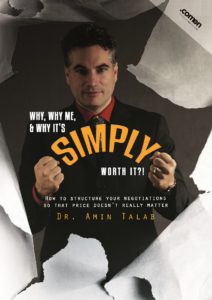If you had the opportunity to ask any question on the topic of negotiation, which questions would you ask?
These were the choices of a group of Bulgarian top-performers in the financial sector:
The best negotiation strategy…
…takes into consideration ones´ goals, but also the interest of both parties, the relative strengths of the negotiation partner, the human needs of influencers and deciders not present at the negotiation table, the expectation effect for future encounters and the relationship level, among a heap of other factors.
When negotiating in a culturally diverse world …
…one has to negotiate the basic understanding first, i.e. what do negotiation partners expect from the process and how do they want to come to a decision. This is inherently more difficult than staying in one´s own culture, since communication clues on all levels (body language, intonation) as well as deeply rooted beliefs (power and thus decision structure, risk averseness, implicitness) have to be taken into account.
To give a very simple example: In one of the last negotiations with an Indian counterpart my client was very disturbed by the fact that woman in question shook her head whenever he argued something. For him, it was like a constant rebuttal. “She is not even listening to my arguments!” was the message my client was getting.
Only after a short recess and my explanation that in that part of India shaking one´s head was equivalent to nodding in France and meant “Yes, I understand, go on…” was he open to concentrate on the issues again.
Negotiations are (not) …
Since we enter negotiations every time we want others to do, think or believe something different then they would without our influence negotiation are all about the art of reaching goals and wielding influence on others. Hence, negotiations are as complex as human interaction can be.
Is there an “unique” negotiation strategy, independent on the different cultural backgrounds…
There are “unique” expressions of feelings that are the same in all cultures, e.g. happiness (corners of the mouth up), sadness (corners of the mouth down), disgust (nose wrinkles), but that is about all that is common.
Since negotiation partners pursue different goals, value different principles and go about differently when achieving objectives, an optimal strategy has to adapt to the situation and the people involved. It certainly helps to know many different strategies and I have developed a “Master strategy” in my book “The Master Negotiator”. However, it involves elements of different strategies and becomes effective by changing the strategy each time to fit the intricacies of the negotiation.
Your vivid example for a challenging and successful situation in negotiations…
I´ve experienced that people find it most challenging and difficult to either negotiate with family (e.g. on how to organize the transfer of a business from one generation to the next), on their own behalf like selling your time and asking for honorary fees (see my German report) or when they want to achieve the objective so badly that they don´t really mind the cost (e.g. they want the job no matter what).
All these situations are challenging, but can be overcome with the focus on the right points and dedication to put time and thought into it. Good negotiators consistently try to enhance their understanding of the process and analyze what works and what can be improved. You can also do this by following my blog here
Some time ago I accompanied a client who faced the situation that he had charged different prices for the same product in different national markets mainly due to diverging purchasing power. When (corporate) purchasers started to organize and exchange information they found out that one (poorer) client had received the product at considerable lower costs. The situation was very difficult and while some buyers did accept the differences and explanation, other insisted to demand the lowest price for themselves.
After several rounds of negotiations we reached a stand-off. It was considered impossible by everyone that we could solve the situation since the poorest buyer would not pay more and contributed a decisive revenue. We decided to do what no one thought thinkable and what never had been done before: the product was pulled out of the cheapest market. The revenue fell, but the argumentative basis for our opponents was demolished. In the short-term my client had to sacrifice considerable revenue, but after not too long the margins worked out and showed in the profit and share price.
Sometimes you can´t budge difficult decisions and you have to take the risk. But as they say: no risk – no gain (and also no fun, of course).
In order to develop our negotiation skills…
you should have a look through the different negotiation theories, work on your options and communication as well as argumentation and listening skills and, in general, identify the 6 core strengths mirrored in the blocks of the Master Negotiator Curriculum.
There is a complimentary video available on those strengths here (middle of the page).
To really play in the top-league plan and take the time (minimum 1 day per year) to actively train and and get intensive feedback from professionals as well as people that you don´t know and won´t see again. I developed a format for exactly with the 1/2 day Negotiation Sparring.
If possible, also get a Ghost Negotiator who reviews difficult situations with you and helps you develop into a Master Negotiator.






